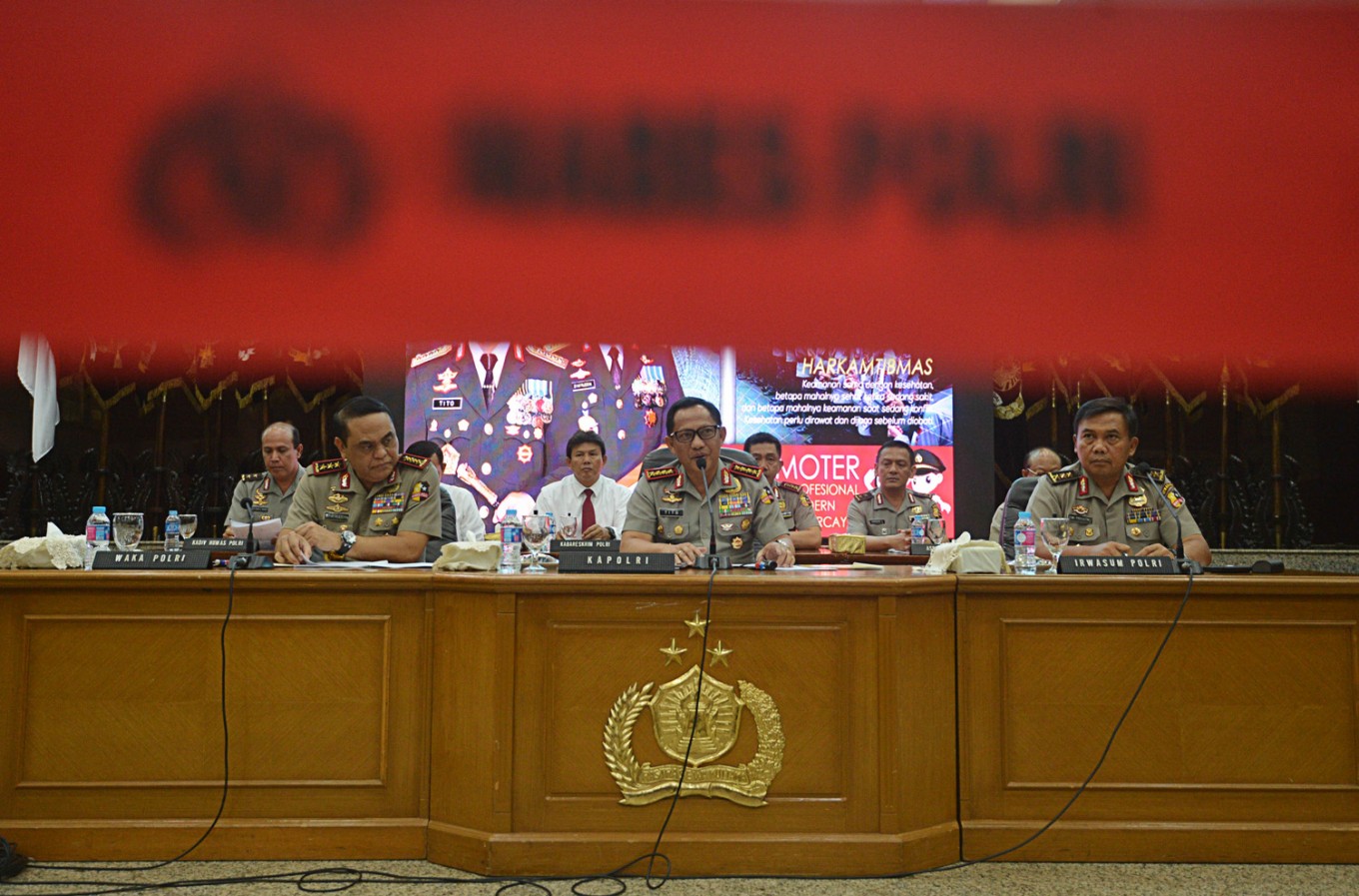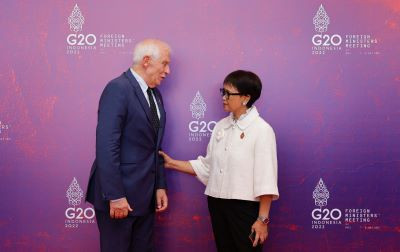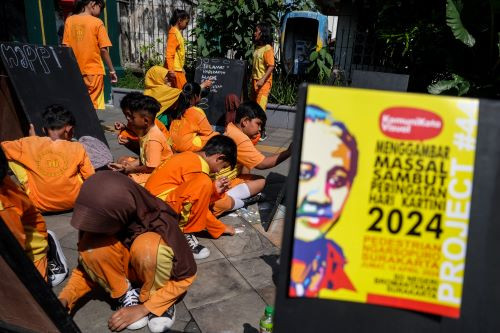COMMENTARY: A piece of advice for Gen. Tito: Don’t feed the trolls!
But the police chief should have known that prosecuting people for spreading fake news or hate speech may not be a clever way to solve the problem.
On social media, what most people want is attention. It is ironic that in their attempt to suppress propaganda, the police ended up amplifying it.
Change Size
 Security talk – National Police chief Gen.Tito Karnavian (center), accompanied by his deputy Comr.Gen.Syafruddin (left) and the police’s general supervision inspector (Irwasum) Comr.Gen. Dwi Priyatno (right), respond journalists’ queries in a press conference in Jakarta on Dec.28. (Antara/Akbar Nugroho Gumay)
Security talk – National Police chief Gen.Tito Karnavian (center), accompanied by his deputy Comr.Gen.Syafruddin (left) and the police’s general supervision inspector (Irwasum) Comr.Gen. Dwi Priyatno (right), respond journalists’ queries in a press conference in Jakarta on Dec.28. (Antara/Akbar Nugroho Gumay)
I
n recent months, National Police chief Gen. Tito Karnavian has waged a ferocious war against rampant fake news and hate speech in the nation’s digital sphere, which he sees as a serious threat to national security that should not be taken lightly.
Tito is right about one thing. Fake news and hate speech are a serious problem. While I find the term “post-truth” obnoxious and elitist, I have to say the term perfectly describes the world we now live in: a world where facts just don’t matter anymore, where people conveniently spread lies just because those are the lies they can agree with.
But the police chief should have known that prosecuting people for spreading fake news or hate speech may not be a clever way to solve the problem.
On social media, what most people want is attention. And so do the people that try to wreak havoc in Indonesia by spreading lies and making false accusations against the government and certain minorities. It is ironic that in their attempt to suppress propaganda, the police ended up amplifying it.
The police, for example, have catapulted an obscure writer from Blora, Central Java, who self-published his books, to national stardom by charging him with defamation last month for arguing that President Joko “Jokowi” Widodo was a closet communist. His poorly researched book,
Jokowi Undercover, has become more popular after his arrest. It is worth noting that the allegation that Jokowi falsified his birth certificate to cover up his identity as a son of a communist is Indonesia’s version of the birther conspiracy. Some people may believe in it, but many have chosen to ignore it as nothing but hogwash.
To fend off accusations that they had violated the freedom of expression, the police decided to hold a press conference to justify their move against the author. But, in another ironic twist, their arguments turned out to be selfdefeating. The police were so eager to explain how absurd the claims made by the author were that I found it baffling that they actually felt the need to take them seriously.
The way the police force handles any criticism against the government and itself has struck me as being driven mainly by paranoia.
In late December, police arrested a man for defacing a wall under a toll road in North Jakarta with profane words directed at Jokowi and Tito. The man, police said, had also claimed to be an Islamic State (IS) group member. Police, however, did not provide evidence that the man, who is 47 and unemployed, might have any links to the terrorist group, nor whether he is mentally fit to face legal process.
The treason charges against a group of anti-government activists, including senior politician Sri Bintang Pamungkas, may also reflect that paranoia. Police have accused Sri Bintang, a has-been politician who many digital natives have never heard of, of incitement through a YouTube video. The video then went viral and was later featured by mainstream media, including on their official YouTube accounts.
On Monday, Twitter decided to suspend the accounts of a notorious hardline group that had threatened to swarm the National Police headquarters to protest against the West Java Police chief, who had moved against its leader. Police denied asking Twitter to do so, but the mainstream media picked up the news, and suddenly more people became more aware of the hard-line group’s social media accounts.
Many argue the police need to get tough on hate-mongers and provocateurs to teach them a lesson and as a deterrent for others. But does it really work?
The police should know that in a war against fake news or propaganda, a victory should be defined not by the conviction of the fake news reporters or propagandists, but by the ability to keep them on the fringes and their voices low.
What is the point of jailing a person for spreading lies if such a move only makes the liar popular and his lies accessible to more people?
The police and the government should deal with fake news and propaganda like decent internet users deal with internet trolls. Those who spread fake news and propaganda are basically internet trolls who only want attention by sowing discord. You deal with internet trolls accordingly, but you should never take them too seriously.
Hate-mongering, anti-government trolls are infesting our democracy in the digital realm. Everyone, not just the police, should take part in fighting them.
There are many ways to combat fake news and propaganda — you can fight them with education, regulation or even technology. The question of which of the three is considered the best solution to the problem is perhaps a matter of debate. But I argue that amplifying fake news and propaganda by elevating those responsible for it to become online martyrs through censorship and criminal charges will only make things worse.
So my advice to you, Gen. Tito: Do not feed the trolls!









